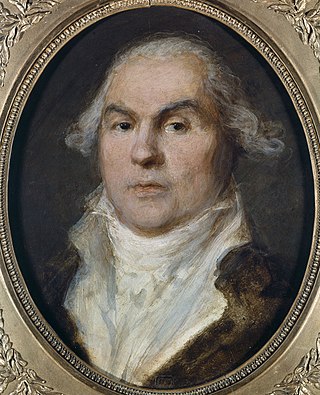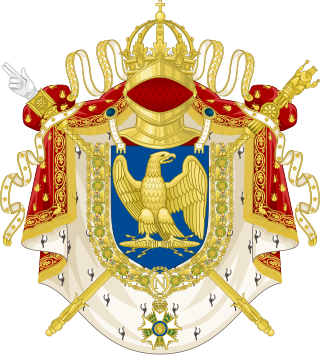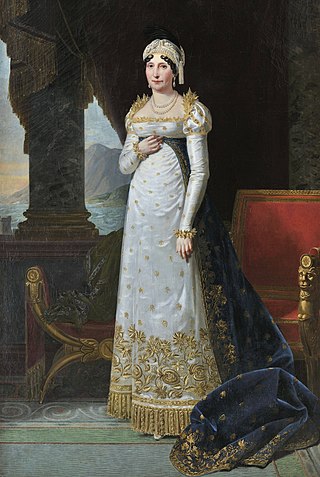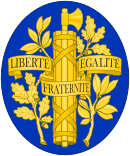
The Napoleonic Wars (1803–1815) were a series of conflicts fought between the First French Empire under Napoleon (1804–1815) and a fluctuating array of European coalitions. The wars originated in political forces arising from the French Revolution (1789–1799) and from the French Revolutionary Wars (1792–1802), and produced a period of French domination over Continental Europe.

Louis Napoléon Bonaparte was a younger brother of Napoleon I, Emperor of the French. He was a monarch in his own right from 1806 to 1810, ruling over the Kingdom of Holland. In that capacity he was known as Louis I.

In the history of France, the First Republic, sometimes referred to in historiography as Revolutionary France, and officially the French Republic, was founded on 21 September 1792 during the French Revolution. The First Republic lasted until the declaration of the First Empire on 18 May 1804 under Napoléon Bonaparte, although the form of the government changed several times.

Lucien Bonaparte, 1st Prince of Canino and Musignano, was a French politician and diplomat of the French Revolution and the Consulate. He served as Minister of the Interior from 1799 to 1800 and as the president of the Council of Five Hundred in 1799.

Napoleon III was the first president of France from 1848 to 1852, and the last monarch of France as Emperor of the French from 1852 until he was deposed in absentia on 4 September 1870.

Joséphine Bonaparte was Empress of the French as the first wife of Emperor Napoleon I from 18 May 1804 until their marriage was annulled on 10 January 1810. As Napoleon's consort, she was also Queen of Italy from 26 May 1805 until the 1810 annulment. She is widely known as Joséphine de Beauharnais.

Napoleon Bonaparte, later known by his regnal name Napoleon I, was a French emperor and military commander who rose to prominence during the French Revolution and led successful campaigns during the Revolutionary Wars. He was the leader of the French Republic as First Consul from 1799 to 1804, then of the French Empire as Emperor of the French from 1804 until 1814, and briefly again in 1815. His political and cultural legacy endures as a celebrated and controversial leader. He initiated many enduring reforms, but has been criticized for his authoritarian rule. He is considered one of the greatest military commanders in history and his wars and campaigns are still studied at military schools worldwide. However, historians still debate whether he was responsible for the Napoleonic Wars in which between three and six million people died.

The Consulate was the top-level government of France from the fall of the Directory in the coup of 18 Brumaire on 10 November 1799 until the start of the Napoleonic Empire on 18 May 1804. By extension, the term The Consulate also refers to this period of French history.

Jean-Jacques-Régis de Cambacérès, Duke of Parma, was a French nobleman, lawyer, freemason and statesman during the French Revolution and the First Empire. He is best remembered as one of the authors of the Napoleonic Code, which still forms the basis of French civil law and French-inspired civil law in many countries.

Louis Antoine de Bourbon, Duke of Enghien was a member of the House of Bourbon of France. More famous for his death than his life, he was executed by order of Napoleon Bonaparte, who brought charges against him of aiding Britain and plotting against Napoleon.

Emperor of the French was the title of the monarch and supreme ruler of the First and the Second French Empires.

Bonapartism is the political ideology supervening from Napoleon Bonaparte and his followers and successors. The term was used to refer to people who hoped to restore the House of Bonaparte and its style of government. In this sense, a Bonapartiste was a person who either actively participated in or advocated for conservative, monarchist and imperial political factions in 19th-century France.

Maria-Letizia Bonaparte, known as Letizia Bonaparte, was a Corsican noblewoman and the mother of Napoleon I of France. As the mother of the Emperor, she received the title of "Madame Mère".

The coup d'état of 2 December 1851 was a self-coup staged by Louis-Napoléon Bonaparte, at the time President of France under the Second Republic. Code-named Operation Rubicon and timed to coincide with the anniversary of Napoleon I's coronation and victory at Austerlitz, the coup dissolved the National Assembly, granted dictatorial powers to the president and preceded the establishment of the Second French Empire a year later.
A referendum ratifying the constitution of the French consulate was held in February 1800. The official results, as announced by Lucien Bonaparte, Minister of the Interior and brother of First Consul Napoleon Bonaparte, were 99.9% in favor of the new constitution, with 53.74% of voters abstaining. However, evidence brought to light by the French historian Claude Langlois in 1972 demonstrated conclusively that Lucien massaged the votes in favor of the constitution, adding up to 20,000 'yes' votes in individual localities, and that there were therefore only some 1,550,000 actual votes for the change.

A referendum on re-establishing the Empire was held in France on 21 and 22 November 1852. Voters were asked whether they approved of the re-establishment of the Empire in the person of Louis Napoléon Bonaparte and family. It was approved by 96.9% of voters with a 79.8% turnout. As with other plebicites under Napoleon III, the result were rigged and only served to legitimize their rule under a false sense of democracy.
Events from the year 1851 in France.

The First French Empire, officially the French Republic, then the French Empire after 1809 and also known as Napoleonic France, was the empire ruled by Napoleon Bonaparte, who established French hegemony over much of continental Europe at the beginning of the 19th century. It lasted from 18 May 1804 to 3 May 1814 and again briefly from 20 March 1815 to 7 July 1815.
Events from the year 1804 in France















